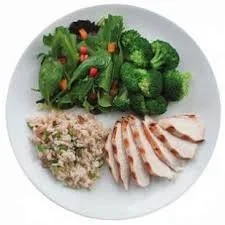The Plate Model
2. Exercise regularly
Regular exercise is an important tool for weight management during menopause. Choose an exercise that you enjoy as you are more likely to keep it up in your routine.
Try and aim to so some aerobic exercise which raises your heart rate for 30 mins x 5 days per week. Examples of aerobic exercise include brisk walking, running, swimming or dancing.
In addition to this, try aim to do muscle strengthening exercises twice per week. Strengthening the muscles can help to reduce some of the muscle mass loss which happens during menopause. Increasing muscle size and strength can help your body to use calories more efficiently which can help in managing your weight. Examples of muscle strengthening exercises include:
Weight lifting
Body weight exercises e.g. squats and push ups
Pilates
More vigorous forms of yoga such as Ashtanga and Vinyasa
3. Eat more protein
Eating more protein can help with managing weight in different ways. Protein foods are very filling which can help regulate appetite and lead to less snacking in between meals.
Protein is also the building blocks of our muscles and can help to preserve muscle mass in menopause, alongside regular muscle strengthening exercises.
Aim to have a palm size portion (equal to ¼ of your plate) which each meal i.e. breakfast, lunch and dinner. Examples of high protein foods in the diet include:
Lean red meats
Chicken
Turkey
Fish
Eggs
Low fat milk, cheese and yoghurt
Tofu
Beans and lentils

















